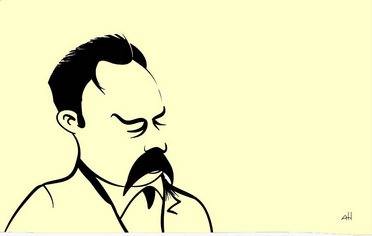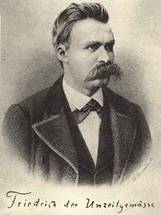One of the courses about the history of contemporary European philosophy:
Phil
 51: Friedrich Nietzsche
51: Friedrich Nietzsche
The aim is that students become familiar with the basic suppositions of Nietzsche’s philosophy and the way it has influenced the modern age. Which social and historical circumstances influenced the occurrence of Nietzsche’s philosophy? How was the Nietzsche’s idea about the overman abused by National- Socialist Party in Germany? What is the basis for his philosophy of life or irrationalism in philosophy? The relation between rationalism and irrationalism. How does his will differ from Schopenhauer’s will? In what amount did Nietzsche’s life influence his philosophy? Why was his work “Thus Spake Zarathustra” classified among the most prominent works in the history of philosophy? Explain metaphorical language “of Zarathustra”. Why did Nietzsche use poetic language, and not logical and discursive language of the traditional metaphysics? Where is vitality of Nietzsche’s philosophy? Why does Nietzsche consider himself the antitraditional philosopher? What does his “anti-movement” consist of, comparing with the traditional philosophy? Does Nietzsche leave the traditional metaphysics or is it impossible to leave it as Martin Heidegger claimed? How did Nietzsche perceive the essence of Christian tradition? Why did man, accepting Christian values, estrange from himself? The roots of Nietzsche’s philosophy are in pre-Socrates’ philosophy (especially in Heracleitu’s philosophy). Why? Nietzsche’s establishment of difference between supersensual world (Christian values) and sensual world (instinctive, animalistic to man). Make difference between Dionysian and Apollonian principle. Explain. Explain Nietzsche’s five main topics:
- Pre-evaluation of all existing values (religion, morality, metaphysics). That represents the essence of his nihilism (Latin: nihil – nothing). The difference between active and passive nihilism. What are the new values that Nietzsche creates? What is the basis for them? The way of destruction of existing Christian values: three metamorphoses of spirit (camel, lion and child)) in “Zarathustra”.
- “God is dead”. Nietzsche thinks about the Christian god. How does Nietzsche understand the Christian god? God died of too big compassion for the weak and sick life. Accepting the Christian god, man turned against his nature, the body that Nietzsche called “the big mind”. Christian god is incarnation of the supersensual sphere. Supersensual sphere is eternal and unchangeable, while the sensual world is changeable, temporary and that is why it is proclaimed worthless and pure illusion by the traditional metaphysics.
- Will for power – explain what is the essence of will for power. It is not the aspiration to something, but wish, aiming to increase the will for power. Body is the order, command of will. Life is will for power. Will is that instinctive, animalistic to a person, telos. The will for power tends to prevail over itself, that is, the existing Christian values. Prevailing over itself, it becomes bigger.
- Overman (Ubermenschen) – Overman says YES to life, YES to will for power. He is strong man who destroys the existing values and establishes brand new. The difference between weak and strong people. Zarathustra is not the overman, but the teacher who teaches about the overman. The whole life is walking on the wire. How from animal to become an overman but not a man. It is the moment of the “great noon”. The source of morality is in immorality. Every moral is the expression of will for power.
- Eternal recurrence of the same – universal idea of Nietzsche’s philosophy (it consists of four previous topics). It refers to the problem of time. Eternal moment of that “now” which occupies past and future in itself. Circular pass of time. How do students understand life? In what amount does our life determine past? Is the past “grave-digger of the present”? Is the past something that exists no more or it is still present now? Should man forget the past in order to have better future? Motif of oblivion in Nietzsche’s philosophy. Is the oblivion integral part of history? How does a man differ from an animal if he forgets? He perceived life through the coreutical moments of game, dance and laughter. Explain. Philosopher is an artist because art is the closest thing to life.
 Literature:
Literature:
- Friedrich Nietzsche “Thus Spake Zarathustra”, “Will to Power”, “Genealogy of Morals”, “Beyond Good and Evil”, “The Joyful Science”, “The Birth of Tragedy”;
- Gilles Deleuze “Nietzsche and Philosophy”;
- Jean Granie “Nietzsche”;
- P. Kunzmann, Franz-Peter Burkard, F. Wiedmann “Atlas Philosophie”;
- V. Korac, B. Pavlovic “The History of Philosophy”, Philosophy textbook for the 4th grade of grammar and vocational schools;
- Cekic, Savic, Cvetkovic “Philosophy”, Philosophy textbook for the 4th grade of grammar and vocational schools.
 Friedrich Nietzsche
Friedrich Nietzsche
Author Antony Hare, 2002.

























